

History and the study of Diana Baumrind. In this article on the 3 parenting styles formulated by Diana Baumrind, you'll get: Quick background information about her research and methods.
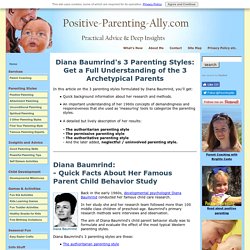
An important understanding of her 1960s concepts of demandingness and responsiveness that she used as 'measuring' tools to categorize the parenting styles. A detailed but lively description of her results: - The authoritarian parenting style- The permissive parenting style- The authoritative parenting style - And the later added, neglectful / uninvolved parenting style. Diana Baumrind: - Quick Facts About Her Famous Parent Child Behavior Study Back in the early 1960s, developmental psychologist Diana Baumrind conducted her famous child care research. Why Parenting Styles Matter When Raising Children.
Developmental psychologists have long been interested in how parents affect child development.
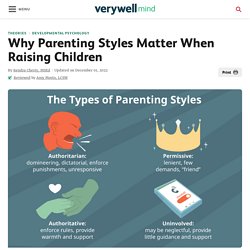
However, finding actual cause-and-effect links between specific actions of parents and later behavior of children is very difficult. Some children raised in dramatically different environments can later grow up to have remarkably similar personalities. Conversely, children who share a home and are raised in the same environment can grow up to have very different personalities. Smaller families in Singapore, leading to unhealthy parenting styles. SINGAPORE: It really didn’t seem that long ago when the Stop at Two campaign was in full swing, warning parents in Singapore that “the more you have, the less they (each) get”.
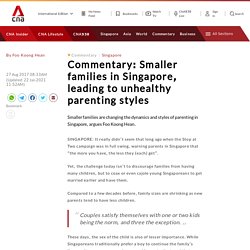
Yet, the challenge today isn’t to discourage families from having many children, but to coax or even cajole young Singaporeans to get married earlier and have them. Compared to a few decades before, family sizes are shrinking as new parents tend to have less children. Couples satisfy themselves with one or two kids being the norm, and three the exception. These days, the sex of the child is also of lesser importance. While Singaporeans traditionally prefer a boy to continue the family’s lineage, it seems more couples are waking up to the trend that daughters make more caring, homely and reliable caregivers in their old age.
Family dynamics are also shifting, as families get smaller. Are you a helicopter parent? - TODAYonline. SINGAPORE — There has been quite a lot of talk about "helicopter parenting", or cosseting, in recent years - so much so that the Ministry of Education (MOE) even shared a post about it on Facebook earlier this month.
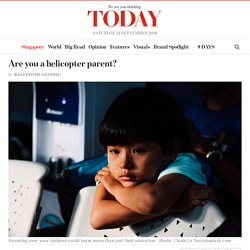
The post linked to an article on MOE's online publication, Schoolbag.sg, which contained illustrations and examples of "helicoptering". These include situations such as bargaining with the child's teacher to give him one more mark so the child can go one grade up, doing the child's project for him instead of letting him do it himself, and "flying" to school with the child's homework when he forgets to bring it with him. The relentlessness of modern parenting - TODAYonline. NEW YORK — Parenthood in the United States has become much more demanding than it used to be.
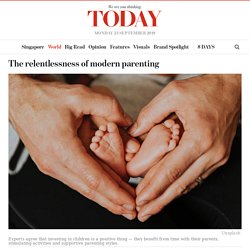
Over just a couple of generations, parents have greatly increased the amount of time, attention and money they put into raising children. Mothers who work outside the home spend just as much time tending their children as stay-at-home mothers did in the 1970s. The amount of money parents spend on children, which used to peak when they were in high school, is now highest when they are under 6 and over 18. Professor Renée Sentilles enrolled her son, Isaac, in lessons beginning when he was an infant. Even now that he’s 12, she rarely has him out of sight when he is home. “I read all the child-care books,” said Prof Sentilles, a professor in Cleveland Heights, Ohio. How Tiger Moms and hovering parents can damage a child’s ability to cope with life’s challenges. Even if you were horrified at the idea of hovering over your child as Amy Chua did in her polarising 2011 bestseller Battle Hymn of the Tiger Mother, I’m betting there was a part of you that looked at her perfect children with at least a tinge of envy.
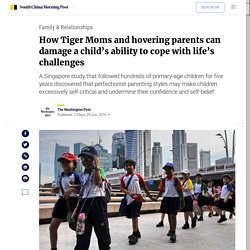
As portrayed in the book, Chua’s magic formula of no play dates, no TV and always being No. 1 in everything (except for gym and drama, of course) ended up producing two girls who were straight-A students and who also were wildly talented in music. Oh, and they both ended up going to Harvard University. Critics predicted that daughters Sophia and Lulu would end up being “mentally ill, friendless robots”, according to a recent “where are they now” profile in The Telegraph in the UK.
Authoritarian Parenting Definition, Characteristics, Examples and More! What is Authoritarian Parenting?
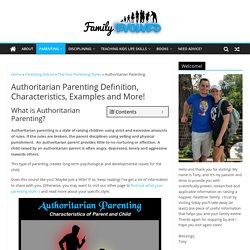
Authoritarian parenting is a style of raising children using strict and excessive amounts of rules. If the rules are broken, the parent disciplines using yelling and physical punishment. An authoritarian parent provides little to no nurturing or affection. Authoritarian Parenting Style And Its Effects. By Stephen Walton © 2012 What's It All About?...
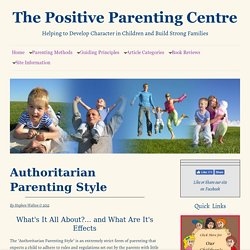
And What Are It's Effects The "Authoritarian Parenting Style" is an extremely strict form of parenting that expects a child to adhere to rules and regulations set out by the parents with little or no input or communication from the child. Summary of the Authoritarian Style. Many Singaporeans’ parenting style not helping children succeed - TODAYonline. I was disturbed to read the report “MP proposes piloting cluster of schools without exams, streaming” (Jan 22).
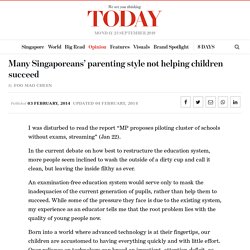
In the current debate on how best to restructure the education system, more people seem inclined to wash the outside of a dirty cup and call it clean, but leaving the inside filthy as ever. An examination-free education system would serve only to mask the inadequacies of the current generation of pupils, rather than help them to succeed. While some of the pressure they face is due to the existing system, my experience as an educator tells me that the root problem lies with the quality of young people now. Born into a world where advanced technology is at their fingertips, our children are accustomed to having everything quickly and with little effort.
Uninvolved Parenting Definition, Characteristics, Examples and More! What is Uninvolved Parenting?
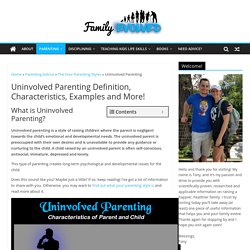
Uninvolved parenting is a style of raising children where the parent is negligent towards the child’s emotional and developmental needs. The uninvolved parent is preoccupied with their own desires and is unavailable to provide any guidance or nurturing to the child. Uninvolved Parenting Style. By Stephen Walton © 2012. Summary of the Uninvolved Style. Mother's permissive parenting harmed sons, court rules in custody battle. A woman has lost custody of her two sons after a judge said she had "significantly failed" the children through permissive parenting, accepting the argument that she acted "more like a friend than a parent" to the two boys.
The judge Laura Harris ruled that the boys, aged 11 and 14, should live with their father, who had "demonstrated far better insight" into their needs and who was more in favour of "structure, boundaries and discipline". The boys' behaviour towards adults showed a lack of discipline and structure, said Harris. Permissive Parenting Definition, Characteristics, Examples and More!
What is Permissive Parenting? Permissive parenting is a style of raising children where the child makes important decisions and lives freely. Permissive Parenting Style. By Stephen Walton © 2012. Summary of the Permissive Style. Bullying: How an 'authoritative' parenting style can help - NetFamilyNews.org. When my friend and colleague Jason Brand, a Berkeley, Calif. -based family therapist, points an article out to me, I pay attention. He and I were discussing resilience as a protective factor in children’s use of social media, and Jason pointed out an article in Scientific American by psychologist Abigail Baird at Vassar College. She wrote it in 2010, when emotions around the tragic case of Massachusetts high school student Phoebe Prince’s suicide were running high, so I needed to get past the first part to see what Jason found useful, and – whether or not you’re a psychologist – I think you will find this informative too.
He zoomed in on what fosters in kids the resilience that reduces the impacts that bullying and cyberbullying can have on them: “authoritative parenting.” The authoritative parenting style: An evidence-based guide. © 2010 - 2017 Gwen Dewar, Ph.D., all rights reserved. Authoritative Parenting Definition, Characteristics, Examples and More! Authoritative Parenting Style. By Stephen Walton © 2012 What's It All About?...
Summary of the Authoritative Style. 4 Parenting Styles - Characteristics And Effects [Infographic] - ParentingForBrain. Summary of the Effects of each Parenting Style. Which one are you? Still unsure? Take this quiz to find out! Parenting Styles No one denies that parenting is difficult, but you can make it easier on yourself by identifying your parenting style. According to scientists, there are four parenting styles. Parents are authoritative, authoritarian, indulgent, or neglectful. Identifying where you fall on the spectrum is a great way to determine what you need to work on to become a better parent.